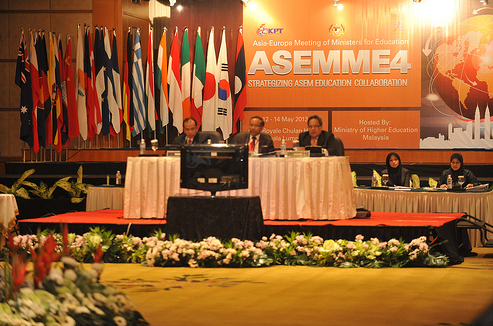Student mobility between Europe and Asia is notably unbalanced in favour of Europe concluded education ministers at the Fourth Asia-Europe Meeting of Ministers for Education (ASEMME4) in Kuala Lumpur last week.
News and business analysis for Professionals in International Education
Have some pie!
Asia-Europe mobility “unbalanced”, say ministers
 Ministers at the Fourth Asia-Europe Meeting of Ministers for Education in Kuala Lumpur last week.
Ministers at the Fourth Asia-Europe Meeting of Ministers for Education in Kuala Lumpur last week. To help shift the flow of students Eastward, the ministers called for measures to improve quality assurance as well as mutual degree recognition.
“Improving mutual recognition of higher education qualifications is a key factor for more balanced mobility to attract more European students to study in Asia, as is better information on the quality of higher education in receiving countries,” Datuk Ab Rahim Md Noor, secretary-general of Malaysia’s Ministry of Higher Education, said as he opened the event.
“Improving mutual recognition of higher education qualifications is a key factor for more balanced mobility”
Noor said this would encompass and synchronised credit transfer, academic cycles, quality assurance systems, qualification recognition and domestic regulations, and warned that without reform, the sustainable movement of students was not likely “to occur effectively”.
According to 2012 OECD education indicators, Asians account for 52% of all students studying abroad worldwide with the largest cohorts coming from China, India and Korea. Europe is the most popular study destination attracting 41% of all foreign students.
The three day conference saw 148 ministers and senior officers from 32 Asian and European countries – all members of the Asia Europe Meeting (ASEM) members – gather to discuss the issues, as well as how to engage business and industry in education and the improvement of technical and vocational education and training (TVET). China, Korea, the UK, Japan, India and Germany were among the countries represented.
TVET will be instrumental in up-skilling workers to meet the needs of a changing global labour market
Ministers identified TVET as instrumental in up-skilling workers to meet the needs of a changing global labour market, emphasising the need for exchange of best practice, introduction of entrepreneurial skills early on in education, and cross-referencing qualification frameworks.
The ASEM Work Placement Pilot Programme, introduced at the ASEM University-Business Forum in November last year, was endorsed by ministers as part of their focus to improve student employability by enhancing cross-cultural skills and real world work experience. Delegates also encouraged education and business stakeholders to collaborate more on preparing competent graduates.
ASEM brings together the 27 European Union member states, two European countries, and the European Commission with 20 Asian countries and the ASEAN Secretariat to address political, economic and cultural issues. In addition to the meeting of education ministers, ASEM Rectors’ Conferences and ASEM University-Business forums are also held regularly.
Still looking? Find by category:



2 Responses to Asia-Europe mobility “unbalanced”, say ministers